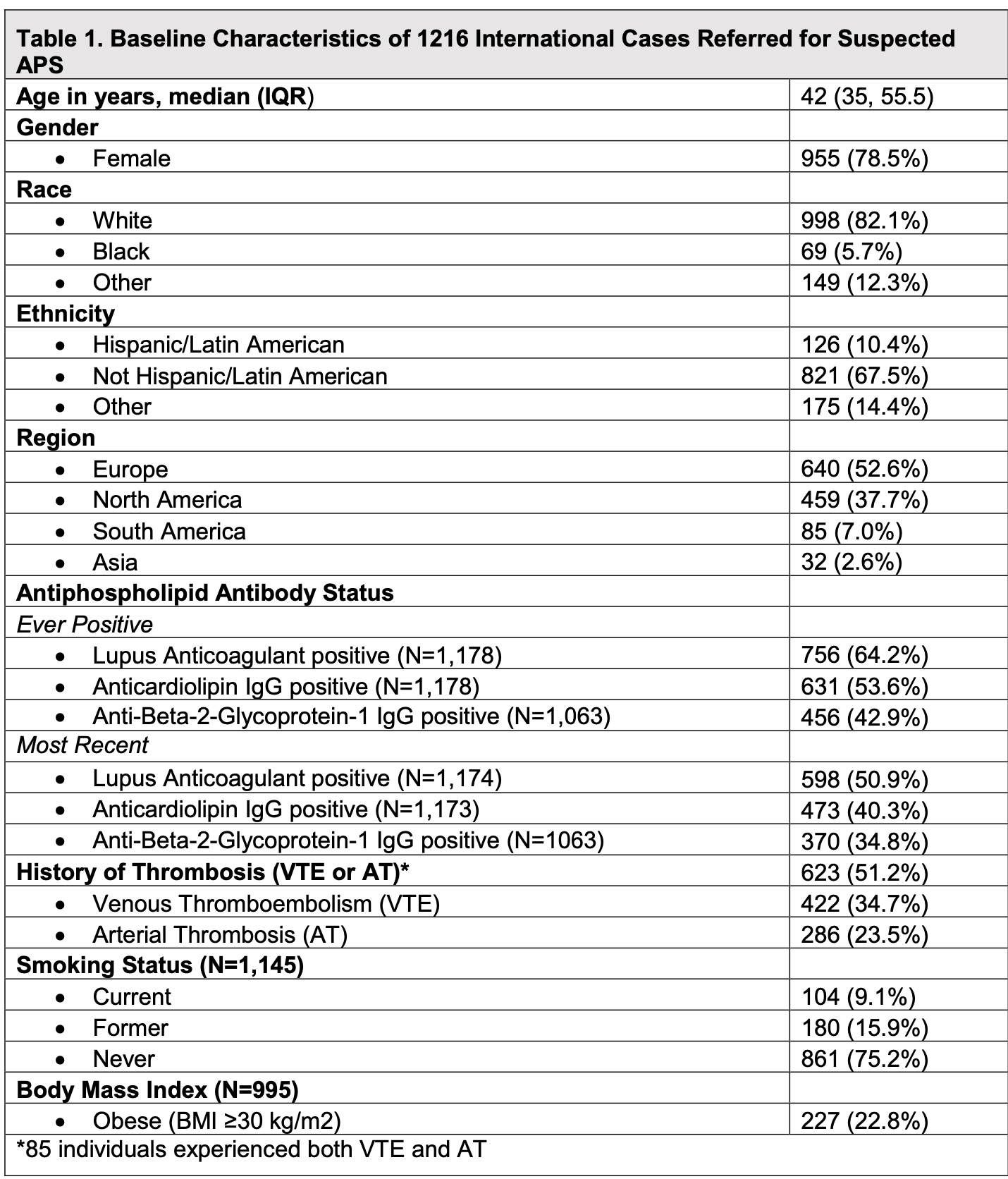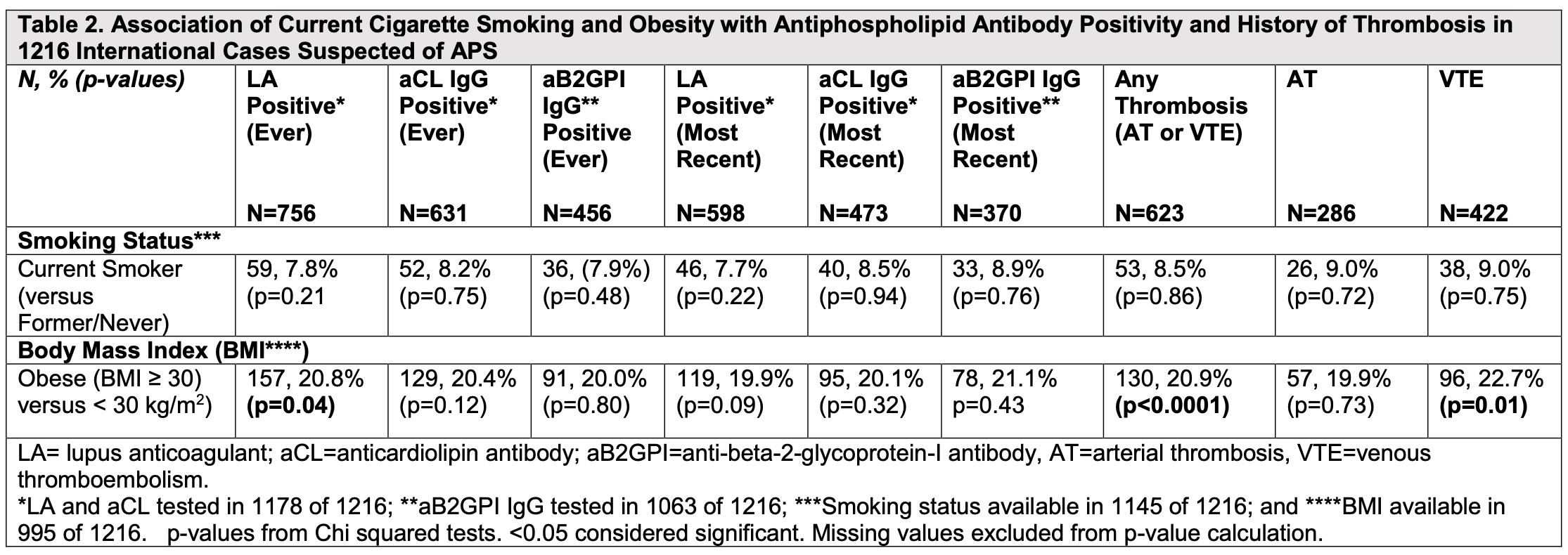Session Information
Session Type: Poster Session A
Session Time: 8:30AM-10:30AM
Background/Purpose: Few studies have evaluated the role of environmental factors in APS. While antiphospholipid antibodies (aPL) may be induced by environmental stiumuli, e.g., viruses, cardiovascular disease and venous thromboembolism (VTE) risk factors may contribute to thrombosis in aPL-positive patients. In particular, we hypothesized that cigarette smoking and obesity might be risk factors for aPL positivity and thrombosis development based on previous literature. Using international multi-center data on patients referred for “suspected APS”, we tested the association of smoking and obesity with aPL positivity and thrombosis.
Methods: We collected 1216 cases of patients referred to 32 major centers in North America, South America, Europe, and Asia for suspected APS (aPL-positive/negative cases with/without history of thrombosis were collected as part of the new APS classification criteria development efforts, with additional questions specific for this project). Demographic, exposure, and clinical data were collected in a standardized format using an online secure REDCap database. For the current analysis, for each case, we also collected information related to current/past/never smoking history and most recent body mass index (BMI) at the office visit. We used t-tests or chi-square tests to evaluate associations of smoking (current versus former/never) and obesity (BMI≥ 30 versus < 30) with ever positive and most recent positive aPL (lupus anticoagulant [LA], anticardiolipin antibody [aCL] IgG, or anti-βeta-2-glycoprotein-I antibody [aβ2GPI] IgG) and with history of any thrombosis (including venous thromboembolism [VTE] or arterial thrombosis [AT]). aPL positivity was defined as test result above the laboratory normal range.
Results: Median age of 1216 cases was 42 years (IQR: 35, 55.5); 78.5% were female, 82.1% White, 10.4% Hispanic/Latinx, and 52.6% were European, and 37.7% North American. 64.2% of patients had positive LA tests, 42.9% had positive aβ2GPI IgG, and 53.6% had positive aCL IgG. 8.6% of patients were current smokers, while 22.8% had BMI≥ 30 kg/m2 at office visit (Table 1). We found no association of current smoking with history of ever or most recent positive LA, aCL IgG, aβ2GPI IgG as well as history of thrombosis overall, VTE, or AT (Table 2). However, obesity was associated with ever (but not most recent) positive LA (p=0.04) and history of thrombosis (p < 0.01), but not ever or most recent positive aCL or aB2GPI IgG positivity (Table 2). Obesity was specifically associated with VTE (p=0.01), but not AT.
Conclusion: Within a cohort of international cases referred for suspected APS, obesity was associated with a history of ever positive LA and with VTE. No clear association of current smoking was demonstrated, possibly due to low prevalence in our cohort. These results are hypothesis-generating and are being pursued in further analyses, accounting for potential confounders such as sociodemographics, concomitant systemic rheumatic disease, and other thrombosis risk factors. Subgroup analyses will evaluate also the association of these environmental stimuli with other aPL isotypes.
To cite this abstract in AMA style:
Barbhaiya M, Jannat-Khah D, Erkan D, Costenbader K, Criteria Development Case Collectors O. Association of Current Cigarette Smoking and Obesity with Antiphospholipid Antibodies and Thrombosis in 1216 International Patients Evaluated for Suspected Antiphospholipid Syndrome (APS) [abstract]. Arthritis Rheumatol. 2021; 73 (suppl 9). https://acrabstracts.org/abstract/association-of-current-cigarette-smoking-and-obesity-with-antiphospholipid-antibodies-and-thrombosis-in-1216-international-patients-evaluated-for-suspected-antiphospholipid-syndrome-aps/. Accessed .« Back to ACR Convergence 2021
ACR Meeting Abstracts - https://acrabstracts.org/abstract/association-of-current-cigarette-smoking-and-obesity-with-antiphospholipid-antibodies-and-thrombosis-in-1216-international-patients-evaluated-for-suspected-antiphospholipid-syndrome-aps/


